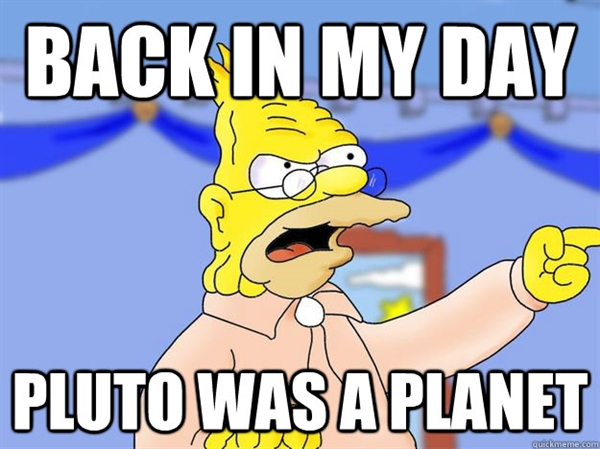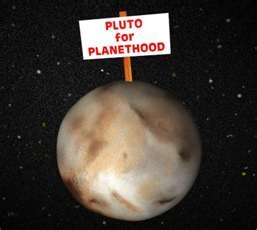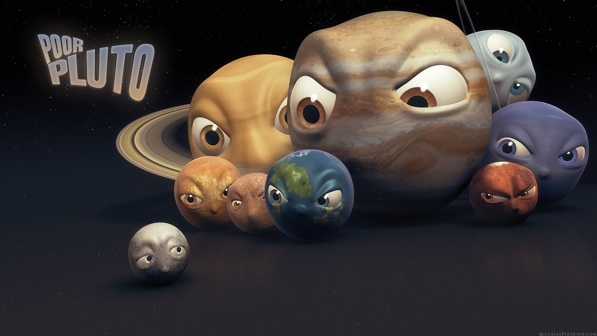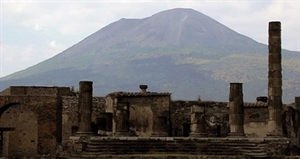Pluto Demoted Day 2024 is on Saturday, August 24, 2024: What really happened to the planet Pluto?
Saturday, August 24, 2024 is Pluto Demoted Day 2024. 10 Holidays You Can Still Celebrate in August pluto demoted day

"Pluto is not a planet," Brown said. "There are finally, officially, eight planets in the solar system."
The vote involved just 424 astronomers who remained for the last day of a meeting of the International Astronomical Union in Prague.
"I'm embarrassed for astronomy. Less than 5 percent of the world's astronomers voted," said Alan Stern, leader of NASA's New Horizons mission to Pluto and a scientist at the Southwest Research Institute.
"This definition stinks, for technical reasons," Stern told Space.com. He expects the astronomy community to overturn the decision. Other astronomers criticized the definition as ambiguous.
The resolution
The decision establishes three main categories of objects in our solar system.
Planets: The eight worlds starting with Mercury and moving out to Venus, Earth, Mars, Jupiter, Saturn, Uranus and Neptune.
Dwarf planets: Pluto and any other round object that "has not cleared the neighborhood around its orbit, and is not a satellite."
Small solar system bodies: All other objects orbiting the sun.
Pluto and its moon Charon, which would both have been planets under the initial definition proposed Aug. 16, now get demoted because they are part of a sea of other objects that occupy the same region of space. Earth and the other eight large planets have, on the other hand, cleared broad swaths of space of any other large objects.
"Pluto is a dwarf planet by the ... definition and is recognized as the prototype of a new category of trans-Neptunian objects," states the approved resolution.
Dwarf planets are not planets under the definition, however.
"There will be hundreds of dwarf planets," Brown predicted. He has already found dozens that fit the category.
Contentious logic
The vote came after eight days of contentious debate that involved four separate proposals at the group's meeting in Prague.
The initial proposal, hammered out by a group of seven astronomers, historians and authors, attempted to preserve Pluto as a planet but was widely criticized for diluting the meaning of the word. It would also have made planets out of the asteroid Ceres and Pluto's moon Charon. But not now.
PLUTO'S PREDICAMENT
Learn more about our former ninth planet, and voice your view on the controversy:
• Read the IAU's planet definition
• Graphic: Where the planets are
• Widow of Pluto's discoverer 'shook up'
• Cosmic Log: The lighter side of Pluto
• Cast your vote on Pluto's ultimate fate
• Sound off on Pluto's demotion
"Ceres is a dwarf planet. it's the only dwarf planet in the asteroid belt," Brown said. "Charon is a satellite."
The category of "dwarf planet" is expected to include dozens of round objects already discovered beyond Neptune. Ultimately, hundreds will probably be found, astronomers say.
The word "planet" originally described wanderers of the sky that moved against the relatively fixed background of star. Pluto, discovered in 1930, was at first thought to be larger than it is. It has an eccentric orbit that crosses the path of Neptune and also takes it well above and below the main plane of the solar system.
Recent discoveries of other round, icy object in Pluto's realm have led most astronomers to agree that the diminutive world should never have been termed a planet.
'A farce'
Stern, in charge of the robotic probe on its way to Pluto, said the language of the resolution is flawed. It requires that a planet "has cleared the neighborhood around its orbit." But Earth, Mars, Jupiter and Neptune all have asteroids as neighbors.
"It's patently clear that Earth's zone is not cleared," Stern told Space.com. "Jupiter has 50,000 Trojan asteroids," which orbit in lockstep with the planet.
ALL ABOUT PLUTO
• Pluto's day: 6.4 Earth days.
• Pluto's year: 248 Earth years.
• Average distance from sun: 3.7 billion miles, or 5.9 billion kilometers.
• What's in a name? Pluto is also the name of the Roman god of the underworld. It was suggested by many people, but credit was given to an 11-year-old girl from England.
• Graphic: Where the planets are
MSNBC / AP
Stern called it "absurd" that only 424 astronomers were allowed to vote, out of about 10,000 professional astronomers around the globe.
"It won't stand," he said. "It's a farce."
Stern said astronomers are already circulating a petition that would try to overturn the IAU decision.
Owen Gingerich, historian and astronomer emeritus at Harvard who led the committee that proposed the initial definition, called the new definition "confusing and unfortunate" and said he was "not at all pleased" with the language about clearing the neighborhood.
Gingerich also did not like the term "dwarf" planet.
"I thought that it made a curious linguistic contradiction," Gingerich said during a telephone interview from Boston (where he could not vote). "A dwarf planet is not a planet. I thought that was very awkward."
Gingerich added: "In the future, one would hope the IAU could do electronic balloting."
Years of debate
Astronomers have argued since the late 1990s on whether to demote Pluto. Public support for Pluto has weighed heavily on the debate. Today's vote comes after a two-year effort by the IAU to develop a definition. An initial committee of astronomers failed for a year to do so, leading to the formation of the second committee whose proposed definition was then redefined for Thursday's vote.
PLUTO IN PERSPECTIVE
Nightly News/NASA
Even though Pluto may have lost its official status as a planet, the frozen world and its kin are still worthy of study, says Louis Friedman, executive director of the nonprofit Planetary Society. “Anytime we visit a new world — planet, moon, asteroid, comet, whatever — we make exciting and surprising new discoveries about the evolution of our solar system and about our own planet,” he said.
NASA's New Horizons probe is in the midst of a 9½-year journey to study Pluto and other icy mini-worlds, and NASA's Paul Hertz said Thursday's decision would have no effect on the mission. “We will continue pursuing exploration of the most scientifically interesting objects in the solar system, regardless of how they are categorized,” he said.
• Probe begins journey to Pluto
• Video: NBC on New Horizons' mission
• Pluto found to have two more moons
MSNBC.com
Astronomers at the IAU meeting debated the proposals right up to the moment of the vote.
Caltech's Mike Brown loses out in one sense. The Pluto-sized object his team found, called 2003 UB313, will now be termed a dwarf planet.
"As of today I have no longer discovered a planet," he said. But Brown called the result scientifically a good decision.
"The public is not going to be excited by the fact that Pluto has been kicked out," Brown said. "But it's the right thing to do."
Textbooks and classroom charts will, of course, have to be revised.
"For astronomers, this doesn't matter one bit. We'll go out and do exactly what we did," Brown said. "For teaching this is a very interesting moment. I think you can describe science much better now" by explaining why Pluto was once thought to be a planet and why it isn't now. "I'm actually very excited."

Is Pluto a planet?
IAU decision and the "Great Pluto War"
Main article: 2006 redefinition of planet
The debate came to a head in 2006 with an IAU resolution that created an official definition for the term "planet". According to this resolution, there are three main conditions for an object to be considered a 'planet':
The object must be in orbit around the Sun.
The object must be massive enough to be a sphere by its own gravitational force. More specifically, its own gravity should pull it into a shape of hydrostatic equilibrium.
It must have cleared the neighbourhood around its orbit.[84]
Pluto fails to meet the third condition.[85] The IAU further resolved that Pluto be classified in the simultaneously created dwarf planet category, and that it act as prototype for a yet-to-be-named category of trans-Neptunian objects, in which it would be separately, but concurrently, classified.
There has been resistance amongst the astronomical community towards the reclassification,[86] dubbed the "Great Pluto War" by some astronomers.[87][88] Alan Stern, principal investigator with NASA's "New Horizons" mission to Pluto, has publicly derided the IAU resolution, stating that "the definition stinks, for technical reasons."[89] Stern's current contention is that by the terms of the new definition Earth, Mars, Jupiter and Neptune, all of which share their orbits with asteroids would be excluded.[90] However, his own published writing has supported the new list of planets, as "our solar system clearly contains" eight planets that have cleared their neighbourhoods.[91] Marc W. Buie of the Lowell observatory has voiced his opinion on the new definition on his website and is one of the petitioners against the definition.[92] Others have supported the IAU. Mike Brown, the astronomer who discovered Eris, said "through this whole crazy circus-like procedure, somehow the right answer was stumbled on. It’s been a long time coming. Science is self-correcting eventually, even when strong emotions are involved."[93]
Among the general public, reception is mixed amidst widespread media coverage. Some have accepted the reclassification, while some are seeking to overturn the decision, with online petitions urging the IAU to consider reinstatement. A resolution introduced by some members of the California state assembly light-heartedly denounces the IAU for "scientific heresy," among other crimes.[94] The U.S. state of New Mexico's House of Representatives passed a resolution declaring that, in honour of Tombaugh, a longtime resident of that state, Pluto will always be considered a planet while in New Mexican skies, with March 13th being known as "Pluto Planet Day".[95] Others reject the change for sentimental reasons, citing that they have always known Pluto as a planet and will continue to do so regardless of the IAU decision.[96]
The verb "pluto" (preterite and past participle: "plutoed") was coined in the aftermath of the decision. In January 2007, the American Dialect Society chose "plutoed" as its 2006 Word of the Year, defining "to pluto" as "to demote or devalue someone or something", an example being "as happened to the former planet Pluto when the General Assembly of the International Astronomical Union decided Pluto no longer met its definition of a planet."[97]

why did they declassify pluto as a planet?
IAU decision to reclassify Pluto
Main article: 2006 redefinition of planet
The debate came to a head in 2006 with an IAU resolution that created an official definition for the term "planet". According to this resolution, there are three main conditions for an object to be considered a 'planet':
The object must be in orbit around the Sun.
The object must be massive enough to be a sphere by its own gravitational force. More specifically, its own gravity should pull it into a shape of hydrostatic equilibrium.
It must have cleared the neighbourhood around its orbit.[89]
Pluto fails to meet the third condition, since its mass was only 0.07 times that of the mass of the other objects in its orbit (Earth's mass, by contrast, is 1.7 million times the remaining mass in its own orbit).[90][91] The IAU further resolved that Pluto be classified in the simultaneously created dwarf planet category, and that it act as prototype for a yet-to-be-named category of trans-Neptunian objects, in which it would be separately, but concurrently, classified.
There has been some resistance amongst the astronomical community towards the reclassification.[92][93][94] Alan Stern, principal investigator with NASA's "New Horizons" mission to Pluto, has publicly derided the IAU resolution, stating that "the definition stinks, for technical reasons."[95] Stern's current contention is that by the terms of the new definition Earth, Mars, Jupiter, and Neptune, all of which share their orbits with asteroids, would be excluded.[96] His other claim is that, since less than 5 percent of astronomers voted for it, the decision was not representative of the entire astronomical community.[96] Marc W. Buie of the Lowell observatory has voiced his opinion on the new definition on his website and is one of the petitioners against the definition.[97] Others have supported the IAU. Mike Brown, the astronomer who discovered Eris, said "through this whole crazy circus-like procedure, somehow the right answer was stumbled on. It’s been a long time coming. Science is self-correcting eventually, even when strong emotions are involved."[98]
Among the general public, reception is mixed amidst widespread media coverage. Some have accepted the reclassification, while some are seeking to overturn the decision, with online petitions urging the IAU to consider reinstatement. A resolution introduced by some members of the California state assembly light-heartedly denounces the IAU for "scientific heresy," among other crimes.[99] The U.S. state of New Mexico's House of Representatives passed a resolution declaring that, in honour of Tombaugh, a longtime resident of that state, Pluto will always be considered a planet while in New Mexican skies, with March 13 being known as "Pluto Planet Day".[100] Others reject the change for sentimental reasons, citing that they have always known Pluto as a planet and will continue to do so regardless of the IAU decision.[101] Some foreign observers view this rejection as an attempt to bend the rules in order to keep the only planet discovered by an American classified as such. [102]
The verb "pluto" (preterite and past participle: "plutoed") was coined in the aftermath of the decision. In January 2007, the American Dialect Society chose "plutoed" as its 2006 Word of the Year, defining "to pluto" as "to demote or devalue someone or something", an example being "as happened to the former planet Pluto when the General Assembly of the International Astronomical Union decided Pluto no longer met its definition of a planet."[103]







